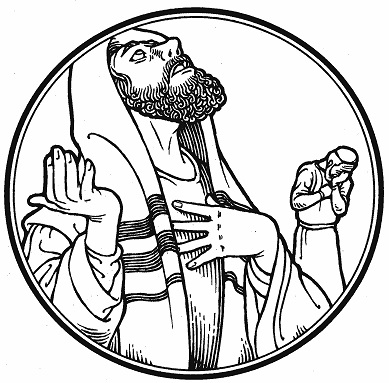Category: Sunday
-
Sixteenth Sunday after Trinity
Readings: 1 Kings 17:17–24 | Ephesians 3:13–21 | Luke 7:11-17 Text: Luke 7:11-17 In the Name + of Jesus. Amen. The name for the town of Nain probably comes from the Hebrew word, na`im, which means “lovely.” It’s familiar to us in English as the woman’s name, Naomi (Ruth 1:2). In God’s wisdom, there’s probably…
-
Fifteenth Sunday after Trinity
Readings: 1 Kings 17:8-16 | Galatians 5:25-6:10 | Matthew 6:24-34 Text: Matthew 6:24-34 Why do you suppose the Bible so often speaks of God providing for His people in times of wilderness, drought, and famine? Abraham and Isaac were kept alive in famine. Joseph went ahead into Egypt so that many would be kept alive…
-
Fourteenth Sunday after Trinity
Readings: Proverbs 4:10-23 | Galatians 5:16-24 | Luke 17:11-19 Text: Luke 17:11-19 A young man I know who just turned five said the other day, “We don’t give anything to God. He gives everything to us.” This warmed my Lutheran pastor heart to hear! Out of the mouth of babes you have prepared praise! Already…
-
Thirteenth Sunday after Trinity
Readings: 2 Chronicles 28:8–15 | Galatians 3:15–22 | Luke 10:23-37 Text: Luke 10:23-37 It may surprise you that Martin Luther did not invent the question, “What does this mean?” Teaching the faith by asking questions is as old the Exodus, “And when in time to come your son asks you, ‘What does this mean?’ you…
-
Twelfth Sunday after Trinity
Readings: Isaiah 29:17–24 | 2 Corinthians 3:4-11 | Mark 7:31-37 Text: Mark 7:31-37 How are you doing? How have you been feeling? This is how we greet people we care about. But how do we answer this question? We probably have an ideal that we’d judge by, kind of like if a medical professional told…
-

Eleventh Sunday after Trinity
Readings: Genesis 4:1-15 | Ephesians 2:1-10 | Luke 18:9-14 Text: Ephesians 2:1-10 This reading from Ephesians 2 is often a go-to passage for us as Reformation Christians. It beautifully covers the doctrines of original sin, election, God’s grace, faith, and even good works. It’s like the Swiss Army knife of Lutherans. These words, so often…
-
Tenth Sunday after Trinity
Readings: Jeremiah 7:1-11 | Romans 9:30-10:4 | Luke 19:41–48 Text: Luke 19:41-48 Zeal can be a beautiful thing. I have to say it is exhilarating being at Higher Things in the worship services with hundreds of voices exultantly singing beautiful, poetic meditations on the Word of God. With our voices declaring the mighty works of…
-
Ninth Sunday after Trinity
Readings: 2 Samuel 22:26–34 | 1 Corinthians 10:6–13 | Luke 16:1–9 Text: Luke 16:1-13 Luke 15 is one of the most popular chapters in this Gospel. It’s refreshing to hear the parables of the Shepherd who seeks out the lost sheep, “And on His shoulder gently laid, And home rejoicing brought me.” (LSB 709:3). We…
-
Seventh Sunday after Trinity
Readings: Genesis 2:7-17 | Romans 6:19-23 | Mark 8:1-9 Text: Mark 8:1-6 What do you think about food? You like it? I do, too. I’m sure we could share some enthusiastic stories about our favorite meals. What would you do to get it? When we’re children, it’s given to us. But when we get older…
-
Sixth Sunday after Trinity
Readings: Exodus 20:1–17 | Romans 6:1–11 | Matthew 5:17–26 Text: Matthew 5:20-26 For centuries, the first thing those learning the Christian faith encounter is the Ten Commandments. We may think they are elementary, and therefore easy to do. After all, they sound so simple: You shall have no other gods. You shall not misuse the…